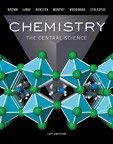
(a)
Interpretation: The band that is the valence band should be determined.
Concept Introduction:The band that forms from bonding molecular orbital in a semiconductor is called the valence band
(b)
Interpretation: The band that is the conduction band should be determined.
Concept Introduction: The band that forms from anti-bonding molecular orbital in a semiconductor is called the conduction band.
(c)
Interpretation: The region of the diagram that represents the band gap should be determined.
Concept Introduction: The band gap is the gap between the valence band and conduction band.
(d)
Interpretation: The band that consists of bonding molecular orbital should be determined.
Concept Introduction:The band that forms from bonding molecular orbital in a semiconductor is called the valence band that contains bonding molecular orbital
(e)
Interpretation: The type of semiconductor represented by the diagram should be explained.
Concept Introduction:An n-type semiconductor is one in which the dopant element has more number of valence electrons than the host element and this leads to an increase in number of negatively charged electrons in the conduction band that can move easily. So, in an n-type semiconductor conduction band is not completely empty.
A p-type semiconductor is one in which the dopant element has less number of valence electrons than the host element and this leads to electron vacancies, known as holes, in the valence band. Thus in a p-type semiconductor the valence band has electron vacancies and is not completely filled with electrons.
(f)
Interpretation: The elements that could be dopant from the given elements
Concept Introduction:The doped semiconductor given in the diagram is a p-type semiconductor. It means the dopant element must have less valence electron than germanium.
Want to see the full answer?
Check out a sample textbook solution
Chapter 12 Solutions
Test Prep Series for AP Chemistry for Chemistry: The Central Science 14th ed AP
- Please help me solve this reaction.arrow_forwardIndicate the products obtained by mixing 2,2-dimethylpropanal with acetaldehyde and sodium ethoxide in ethanol.arrow_forwardSynthesize 2-Ethyl-3-methyloxirane from dimethyl(propyl)sulfonium iodide using the necessary organic or inorganic reagents. Draw the structures of the compounds.arrow_forward
- Synthesize 2-Hydroxy-2-phenylacetonitrile from phenylmethanol using the necessary organic or inorganic reagents. Draw the structures of the compounds.arrow_forwardSynthesize N-Methylcyclohexylamine from cyclohexanol using the necessary organic or inorganic reagents. Draw the structures of the compounds.arrow_forwardSynthesize N-Methylcyclohexylamine from cyclohexanol using the necessary organic or inorganic reagents. Draw the structures of the compounds.arrow_forward
- If possible, please provide the formula of the compound 3,3-dimethylbut-2-enal.arrow_forwardSynthesize 1,4-dibromobenzene from acetanilide (N-phenylacetamide) using the necessary organic or inorganic reagents. Draw the structures of the compounds.arrow_forwardIndicate the products obtained by mixing (3-oxo-3-phenylpropyl)triphenylphosphonium bromide with sodium hydride.arrow_forward
- We mix N-ethyl-2-hexanamine with excess methyl iodide and followed by heating with aqueous Ag2O. Indicate the major products obtained.arrow_forwardIndicate the products obtained by mixing acetophenone with iodine and NaOH.arrow_forwardIndicate the products obtained by mixing 2-Propanone and ethyllithium and performing a subsequent acid hydrolysis.arrow_forward
 ChemistryChemistryISBN:9781305957404Author:Steven S. Zumdahl, Susan A. Zumdahl, Donald J. DeCostePublisher:Cengage Learning
ChemistryChemistryISBN:9781305957404Author:Steven S. Zumdahl, Susan A. Zumdahl, Donald J. DeCostePublisher:Cengage Learning ChemistryChemistryISBN:9781259911156Author:Raymond Chang Dr., Jason Overby ProfessorPublisher:McGraw-Hill Education
ChemistryChemistryISBN:9781259911156Author:Raymond Chang Dr., Jason Overby ProfessorPublisher:McGraw-Hill Education Principles of Instrumental AnalysisChemistryISBN:9781305577213Author:Douglas A. Skoog, F. James Holler, Stanley R. CrouchPublisher:Cengage Learning
Principles of Instrumental AnalysisChemistryISBN:9781305577213Author:Douglas A. Skoog, F. James Holler, Stanley R. CrouchPublisher:Cengage Learning Organic ChemistryChemistryISBN:9780078021558Author:Janice Gorzynski Smith Dr.Publisher:McGraw-Hill Education
Organic ChemistryChemistryISBN:9780078021558Author:Janice Gorzynski Smith Dr.Publisher:McGraw-Hill Education Chemistry: Principles and ReactionsChemistryISBN:9781305079373Author:William L. Masterton, Cecile N. HurleyPublisher:Cengage Learning
Chemistry: Principles and ReactionsChemistryISBN:9781305079373Author:William L. Masterton, Cecile N. HurleyPublisher:Cengage Learning Elementary Principles of Chemical Processes, Bind...ChemistryISBN:9781118431221Author:Richard M. Felder, Ronald W. Rousseau, Lisa G. BullardPublisher:WILEY
Elementary Principles of Chemical Processes, Bind...ChemistryISBN:9781118431221Author:Richard M. Felder, Ronald W. Rousseau, Lisa G. BullardPublisher:WILEY





